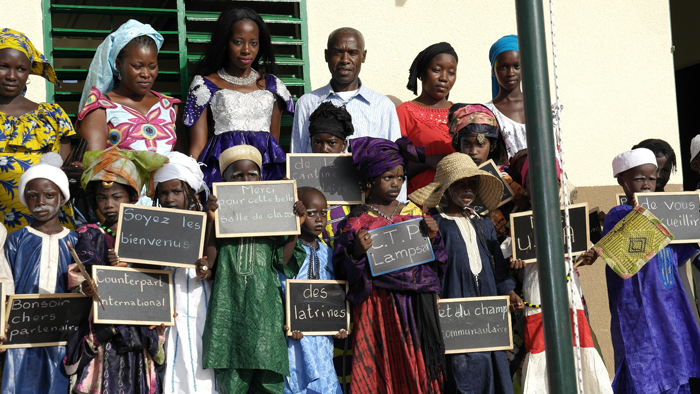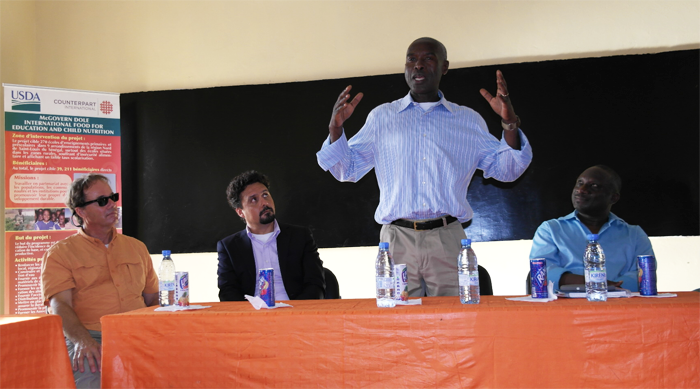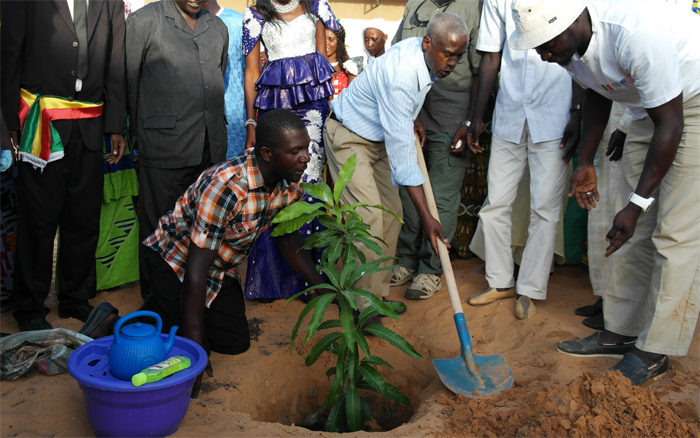
U.S. Ambassador Tulinabo Mushingi (center), surrounded by Lampsar Preschool students and staff in Saint Louis, Senegal, on September 13, 2017.
By: Desire Yameogo
While it may be summer break in Senegal, on Wednesday 61 young students of Lampsar Preschool filled their classroom for a very special occasion. Together with their families and community leaders, the children joined in a chorus to sing a warm welcome to the U.S. Ambassador to Senegal.
“I want to thank the community of Lampsar for their engagement and participation in this project, and I welcome their enormous effort,” stated U.S. Ambassador to Senegal Tulinabo Mushingi upon his arrival at Lampsar Preschool. “I am pleased to see our partner Counterpart International, with whom we work in Senegal and in other countries around the world,” observed the Ambassador.
Ambassador Mushingi toured the new school facilities, which Counterpart helped to build, including a new classroom, school canteen, latrines, and a thriving community garden.
The community garden supplements the food assistance that the Lampsar school receives through the USDA McGovern-Dole Food for Education Program. The garden also ensures that the community of Saint Louis will continue to cultivate a nutritious food supply for many years to come.

U.S. Ambassador Mushingi (standing) recalled how, as a young foreign service officer, he worked with Senator McGovern when McGovern was the U.S. Ambassador to the United Nations Agencies for Food and Agriculture.
“Children are now eager to come to the school because of the school canteen, and they no longer need to go home to look for a snack during the break,” said Mrs. Lena Seck, Director of the Lampsar Preschool. Mrs. Seck also praised the value of the new latrines to the school community’s health and wellness.
“Youth are a priority for the Emerging Senegal Plan and they are also a priority for the U.S. Government. The next generation must be well trained to replace us and continue the development of Senegal,” said Ambassador Mushingi. “I am very pleased to hear that the community and the Government of Senegal are already committed to the sustainability of this project,” he added.
Ambassador Mushingi helped the school staff plant a mango tree to commemorate their progress. He requested that they all reunite again in the future to celebrate the tree’s harvest together.
Counterpart has implemented food security capacity building programs in Senegal for more than ten years, helping communities raise healthy, educated children. From early childhood health interventions such as Vitamin A distribution, to building sustainable infrastructures like community gardens, we have helped our local partners create a foundation for sustainable growth. Our Food for Education programming has increased agricultural capacity, childhood nutrition rates and school enrollment rates. As our partners in Senegal take increasing ownership of these programs, these communities are now empowered to sustain and build upon these achievements.

U.S. Ambassador Mushingi (center, with shovel) helps to plant a mango tree at the Lampsar School in Saint Louis, Senegal, in honor of the Food for Education program’s success.




